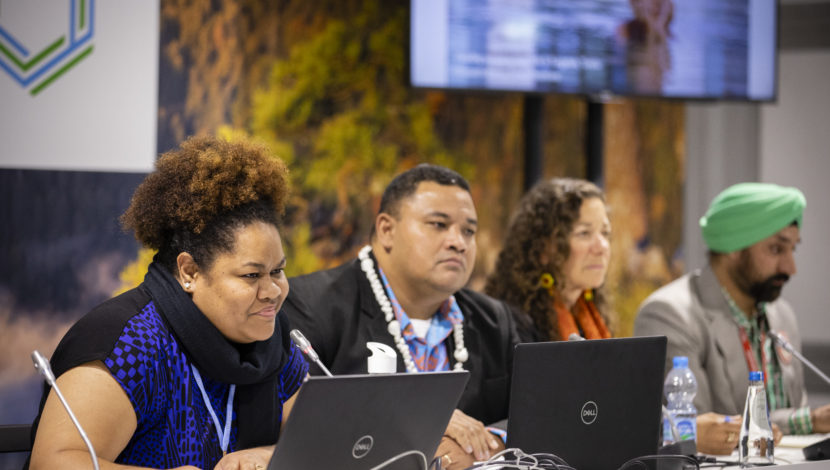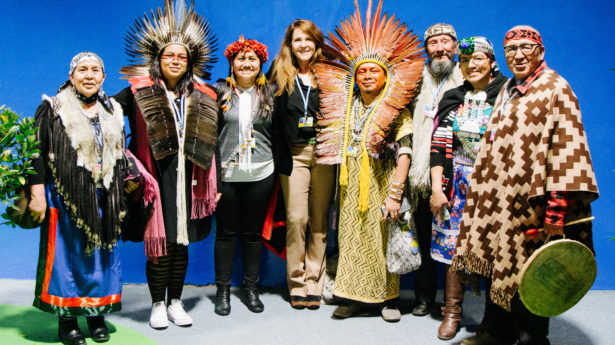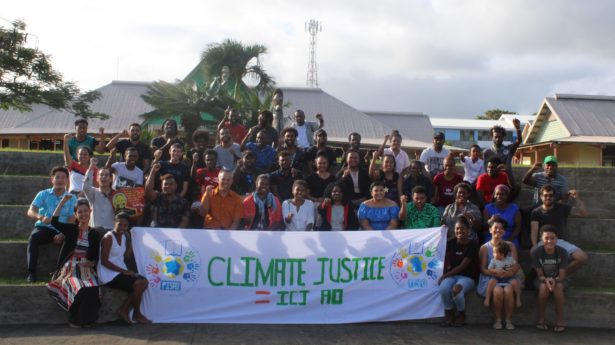The Unitarian Universalist Service Committee advances human rights through grassroots collaborations.
What is COP26 and Why Does it Matter?

By on November 3, 2021
This week, politicians and diplomats from around the globe arrive in Glasgow, Scotland for the 26th annual Conference of the Parties (COP26): a 13-day meeting of the state parties to the United Nations Framework Convention on Climate Change (UNFCCC). Their goal is to hash out a set of nonbinding commitments that each government can make to address the shared global challenge of climate change.
The occasion is important for several reasons. For one, it marks the first time that UNFCCC state parties have met together since 2019 (as the typically-yearly conference was postponed in November 2020 due to the COVID-19 pandemic).
COP26 will also be a special installment in the series of high-level talks. Under the terms of the 2015 Paris Agreement, state parties to the accord are supposed to increase their commitments to address climate change every five years. The first round of this “ratcheting up” in policy ambition was therefore initially supposed to take place last November. Since that conference was delayed, this is now the year for governments to make good on their promises.
COP26 therefore presents a unique opportunity for the world’s most powerful governments, including the United States, to show they are serious about confronting the climate crisis.
What should the U.S. delegation at COP commit to do?
Policy responses to climate change come in three forms. States can seek to mitigate climate change, adapt to it, and to pay for the irrecoverable losses and damages that have already occurred, or will inevitably occur, as a result of the climate crisis.
UUSC’s position is that all three kinds of climate response are necessary, and the United States must contribute more toward meeting these goals. This is true not only because the U.S. has a duty of human solidarity in the face of a global problem (one that affects people around the globe unevenly and in systematically unjust ways), but also because of the outsized role the U.S. has played in causing climate change in the first place.
Therefore, the U.S. government should help mitigate further global warming by reducing its annual carbon emissions (UUSC’s partners and other advocates regard a 70% emissions reduction by 2030 as an achievable target). This would help slow the pace of warming and ensure that negative effects from climate change will be less severe.
Secondly, the U.S. should contribute additional funding to help other countries around the world adapt to, and recover the losses and damages of, a global climate crisis they did little to cause. We and our coalition partners estimate that $800 billion in additional climate finance by 2030 would cover the United States’ fair share of climate costs, considering the size of its economy and the historical role it has played in contributing to the crisis.
How likely is it that the U.S. will meet these targets?
Not very. The U.S. delegation arrives in Glasgow at a time when prospects for climate legislation in the U.S. have dimmed. The Biden administration and Democratic leadership in Congress were originally hoping to use budget reconciliation to enact sweeping new climate commitments into law, resulting in significant emissions reductions. Conservative members of their own caucus, however, have sought to stymie many of those plans. As a result, U.S. leadership may not be able to swiftly enact whatever commitments emerge from COP into binding legislation.
So what can we hope for from this conference?
U.S. leadership has made some progress recently toward facing the reality of the climate crisis and formulating plans to address it. Among other steps, the Biden administration released a groundbreaking report that—for the first time—acknowledged in a systematic way the impact climate change is having on global migration patterns, and called for an expansion of humanitarian protection for the people affected by what UUSC has long referred to as climate-forced displacement.
As welcome as the administration’s words are, however, they are contradicted by their own actions. The Biden administration needs to not just talk about expanding pathways for humanitarian migration, but actually do so—starting with the elimination of the Title 42 asylum ban that they continue to enforce.
Moreover, the Biden administration needs to not just ponder climate solutions in a vacuum, or under the influence of wealthy donors. Instead, they must follow the leadership of the people already living on the front lines of this crisis. UUSC’s partners, many of whose communities already face sea-level rise, increasingly severe storms, and other forms of climate destruction, have made their recommendations to the administration clear. As Indigenous communities, they also hold the key to addressing the climate crisis, as Indigenous people globally steward the overwhelming majority of the earth’s biodiversity and a large portion of its carbon reserves.
U.S. political leaders should heed their words and follow the leadership of the most impacted communities in this year’s COP. Doing so means supporting calls from Global South nations for spending on loss and damage; supporting greater protections for Indigenous land rights and sovereignty, which are key to solving the climate crisis as they help prevent reckless destruction of carbon sinks and extraction of more planet-warming fuels; and heeding demands from UUSC’s Indigenous partners for remedial action here in the U.S.
As common sense as it may sound to listen to and follow the leadership of the people already living with and responding to the climate crisis, the wealthy government conveners of COP26 have failed in this regard even before COP began. During the lead-up to the convention, many directly affected communities pointed out that attending an in-person conference in Glasgow was neither safe nor feasible for them, particularly as people in many parts of the Global South have been denied the opportunity to get vaccinated. By pressing ahead with the in-person event and refusing to host a virtual alternative anyway, conference organizers caused the de facto exclusion of many participants from the Global South and the Pacific—even as these countries are experiencing the worst and most imminent climate effects!
Rich governments and politicians have to do better. If they mean what they say about wanting to address the climate crisis, they should start listening to and learning from the people most affected by its reality. COP26 offers a chance to do so, if they will seize it. Help us prompt them to take this step by calling for a human rights–based response to climate change today.
Image Credit: Joel Sheakoski

